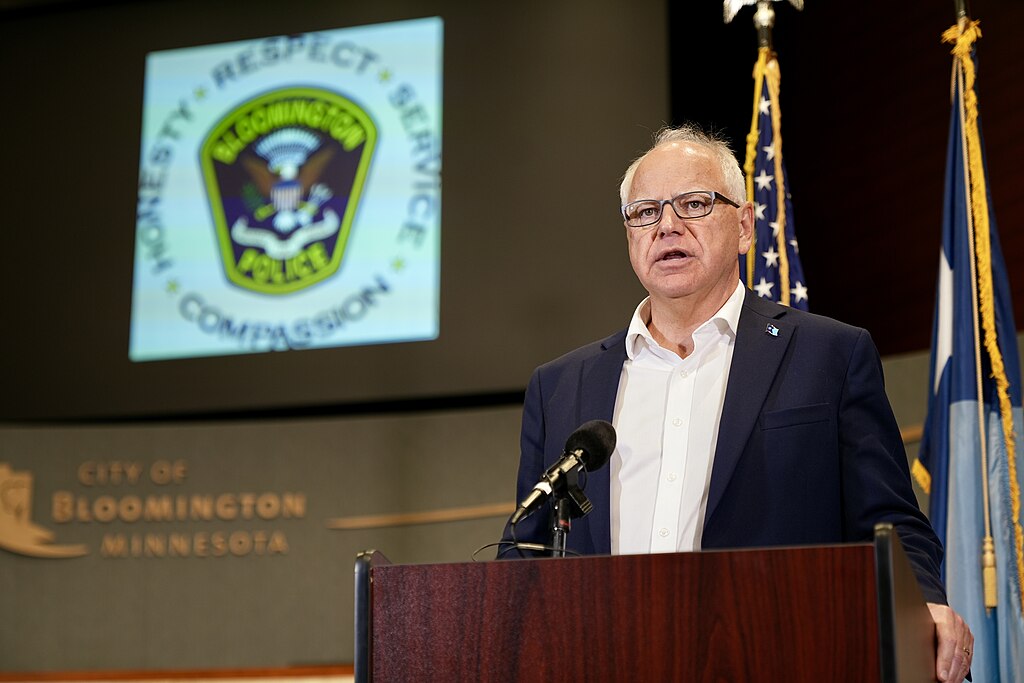Conservative commentator Ann Coulter stirred controversy after launching a sharp critique at Gus Walz, the son of Democratic vice presidential nominee Tim Walz, for showing emotion during his father's speech at the Democratic National Convention (DNC). The incident occurred on the third night of the convention, as Tim Walz delivered a heartfelt address to the nation, during which his son Gus was seen tearing up and expressing pride in his father’s words.
As Tim Walz acknowledged his family during the speech, Gus Walz was visibly moved, mouthing the words "That's my dad" as tears welled up in his eyes. The moment, captured on live television, quickly became a talking point on social media, with many expressing admiration for the strong family bond on display.
However, the following day, Ann Coulter took to X, formerly known as Twitter, to deride Gus Walz’s emotional response. Coulter, known for her provocative commentary, wrote, “Talk about weird,” referring to Gus's tears. Her post immediately sparked a wave of backlash from users across the political spectrum, who condemned her remarks as insensitive and out of touch.
Journalists and commentators were quick to respond to Coulter’s critique, highlighting the humanity in Gus Walz’s reaction and questioning Coulter’s intent behind the comment. Brennan Stultz, a political journalist, was among the first to challenge Coulter, questioning why she found a son’s visible pride and affection for his father to be “weird.” Stultz and others pointed out that the display of genuine emotion during such a significant moment was not only natural but also endearing.
The backlash against Coulter’s comment was swift and widespread, with many accusing her of attempting to demean a moment that resonated with viewers for its authenticity. Critics suggested that Coulter’s remarks were not only a poor reflection of her own values but also indicative of a broader lack of empathy within certain segments of political discourse.
This incident is not the first time Coulter has faced criticism for her polarizing comments on social media. Known for her confrontational style, Coulter has often courted controversy by targeting public figures and political opponents with sharp-tongued rhetoric. However, this latest comment has struck a particularly sensitive chord, as it involves a family moment that many viewed as a rare and touching display of emotion in the often-stoic world of politics.
As the fallout from Coulter’s comment continues to unfold, it serves as a reminder of the deep divides in the current political climate, where even personal and familial moments are not immune from becoming flashpoints in the ongoing culture wars. While Coulter’s supporters may defend her right to speak her mind, the broader reaction underscores the growing demand for a more compassionate and respectful public dialogue.
The incident at the DNC, and the subsequent reactions to Coulter’s tweet, highlight the challenges of navigating political discourse in an era where personal moments are instantly broadcast to millions and subject to intense scrutiny. As the nation moves forward in a heated election season, such moments will likely continue to spark debate, reflecting the broader tensions that define this contentious period in American politics.



 Japan Election 2026: Sanae Takaichi Poised for Landslide Win Despite Record Snowfall
Japan Election 2026: Sanae Takaichi Poised for Landslide Win Despite Record Snowfall  Anutin’s Bhumjaithai Party Wins Thai Election, Signals Shift Toward Political Stability
Anutin’s Bhumjaithai Party Wins Thai Election, Signals Shift Toward Political Stability  US Pushes Ukraine-Russia Peace Talks Before Summer Amid Escalating Attacks
US Pushes Ukraine-Russia Peace Talks Before Summer Amid Escalating Attacks  Trump Backs Nexstar–Tegna Merger Amid Shifting U.S. Media Landscape
Trump Backs Nexstar–Tegna Merger Amid Shifting U.S. Media Landscape  Trump Congratulates Japan’s First Female Prime Minister Sanae Takaichi After Historic Election Victory
Trump Congratulates Japan’s First Female Prime Minister Sanae Takaichi After Historic Election Victory  Trump’s Inflation Claims Clash With Voters’ Cost-of-Living Reality
Trump’s Inflation Claims Clash With Voters’ Cost-of-Living Reality  Nicaragua Ends Visa-Free Entry for Cubans, Disrupting Key Migration Route to the U.S.
Nicaragua Ends Visa-Free Entry for Cubans, Disrupting Key Migration Route to the U.S.  Trump Signs “America First Arms Transfer Strategy” to Prioritize U.S. Weapons Sales
Trump Signs “America First Arms Transfer Strategy” to Prioritize U.S. Weapons Sales  Bosnian Serb Presidential Rerun Confirms Victory for Dodik Ally Amid Allegations of Irregularities
Bosnian Serb Presidential Rerun Confirms Victory for Dodik Ally Amid Allegations of Irregularities  Antonio José Seguro Poised for Landslide Win in Portugal Presidential Runoff
Antonio José Seguro Poised for Landslide Win in Portugal Presidential Runoff  Pentagon Ends Military Education Programs With Harvard University
Pentagon Ends Military Education Programs With Harvard University  Ohio Man Indicted for Alleged Threat Against Vice President JD Vance, Faces Additional Federal Charges
Ohio Man Indicted for Alleged Threat Against Vice President JD Vance, Faces Additional Federal Charges  Federal Judge Restores Funding for Gateway Rail Tunnel Project
Federal Judge Restores Funding for Gateway Rail Tunnel Project  Japan’s Prime Minister Sanae Takaichi Secures Historic Election Win, Shaking Markets and Regional Politics
Japan’s Prime Minister Sanae Takaichi Secures Historic Election Win, Shaking Markets and Regional Politics  Trump Signs Executive Order Threatening 25% Tariffs on Countries Trading With Iran
Trump Signs Executive Order Threatening 25% Tariffs on Countries Trading With Iran  Ghislaine Maxwell to Invoke Fifth Amendment at House Oversight Committee Deposition
Ghislaine Maxwell to Invoke Fifth Amendment at House Oversight Committee Deposition  Israel Approves West Bank Measures Expanding Settler Land Access
Israel Approves West Bank Measures Expanding Settler Land Access 































